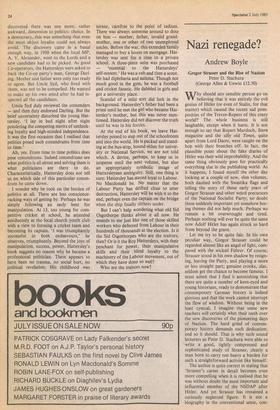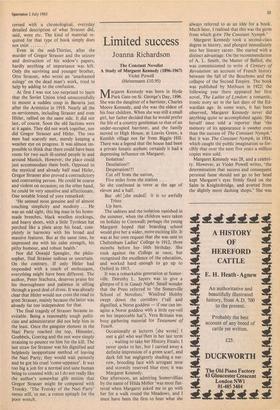Nazi renegade?
Andrew Boyle
Gregor Strasser and the Rise of Nazism Peter D. Stachura (George Allen & Unwin £12.50) Why should any sensible person go on believing that it was entirely the evil genius of Hitler (or even of Stalin, for that matter) which caused the recent sad porn- posities of the Trevor-Ropers of this crazy world? The whole business is still laughable, except when it hurts. It is not enough to say that Rupert Murdoch, Stern magazine and the silly old Times, quite apart from Lord Dacre, were caught on the hop with their breeches off. In fact, the plausible point about the fake diaries of Hitler was their wild improbability. And the same thing obviously goes for practically everything else in the publishing world. As it happens, 1 found myself the other day looking at a couple of new, slim volumes, both daubed with the Swastika flags and telling the story of those early years of Gregor Strasser and other weird precursors of the National Socialist Party; no doubt these suddenly important yet somehow bor- ing themes did not help much. Perhaps we remain a bit overwrought and tired. Perhaps nothing will ever be quite the same now Adolf Hitler has again struck us hard from beyond the grave.
Let me try to be quite fair. In his own peculiar way, Gregor Strasser could be regarded almost like an angel of light, com- pared with the wicked Parer. Of course, Strasser stood in his own shadow by resign- ing, leaving the Party, and playing a more or less straight part; genuine crooks, alas, seldom get the chance to become famous. I must admit that I find it astonishing that there are quite a number of keen-eyed and young historians, ready to demonstrate that contemporary German history is indeed glorious and that the work cannot interrupt the flow of wisdom. Without being in the least cynical, I imagine that some new teachers will certainly whet their teeth over the new discoveries of the pioneering days of Nazism. The hard grind of contem- porary history demands such dedication; and so it should. That is why such sound lecturers as Peter D. Stachura were able to \ write a good, tightly compressed and sophisticated study of Strasser, clearly a man born to carry too heavy a burden for such a straightforward activist like himself.
The author is quite correct in stating that 'Strasser's career in detail becomes even more compelling when it is realised that he was without doubt the most important and influential member of the NSDAP after Hitler. And yet Strasser has remained a curiously neglected figure. It is not a biography in the conventional sense, con- cerned with a chronological, everyday detailed description of what Strasser did, said, wore etc. The kind of material re- quired for that type of book simply does not exist Even in the mid-Thirties, after the murder of Gregor Strasser and the seizure and destruction of his widow's papers, hardly anything of importance was left. Only the surviving and younger brother, Otto Strasser, who wrote an 'unashamed eulogy' on the dead man's work, tried to help by adding to the confusion.
At first I was not too surprised to learn that the Soviet Union tried unsuccessfully to mount a sudden coup in Bavaria just after the Armistice in 1919. Nearly all the ex-servicemen, including Strasser and even Hitler, rallied on the same side. It did not last, of course. Soon the old factions were at it again. They did not work together, nor did Gregor Strasser and Hitler. The two men had scarcely met, merely keeping a weather eye on progress. It was almost im- possible to think that there could have been room for two such ill-sorted people in and around Munich. However, the place could just accommodate them both. Opposed to, the mystical and already half mad Hitler, Gregor Strasser also proved a contradictory and contrasting person. He could be coarse and violent on occasion; on the other hand, he could be very sensitive and affectionate. One notable friend of yore remarked:
'He seemed most genuine and of almost touching simplicity and modesty ... He was an odd sight, this big man in his home- made breeches, black woollen stockings, and heavy shoes, with a little Tyrolean hat perched like a plate atop his head, com- pletely in harmony with his broad and massive features. But at the same time, he impressed me with his calm strength, his pithy humour, and robust health.'
Nor did Oswald Spengler, the philo- sopher, find Strasser tedious or uncertain. On the contrary. If only Hitler had responded with a touch of enthusiasm, everything might have been different. The author, Peter Stachura, deserves praise for his thoroughness and patience in sifting through a good deal of dross. It was already clear that Hitler would not cross the road to greet Strasser, mainly because the latter was already far too independent for that.
The final tragedy of Strasser became in- evitable. Being a reasonably tough politi- cian and administrator did not help him in the least. Once the gangster element in the Nazi Party reached the top, Himmler, Goebbels, Goering and the rest were simply straining to pounce on him for the kill. The last straw for Strasser was his dignified and helplessly inopportune method of leaving the Nazi Party; they would wait patiently and he got his cruel 'come-uppance'. It was too big a job for a normal and sane human being to contend with; so 1 do not really like the author's somewhat glib notion that Gregor Strasser might be compared with Trotsky. 'The Trotsky of the Nazi Party' seems still, to me, a rotten epitaph for the poor wretch.







































 Previous page
Previous page